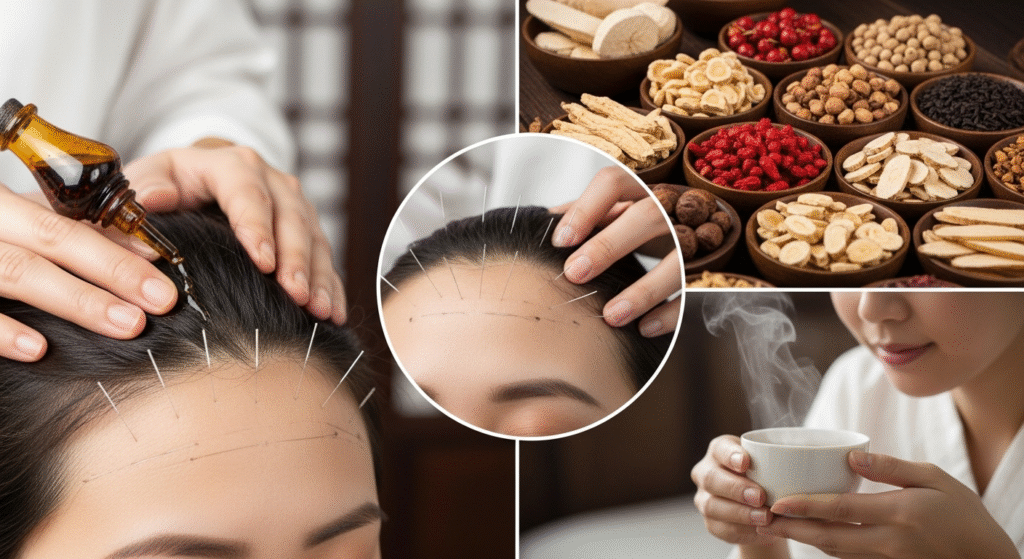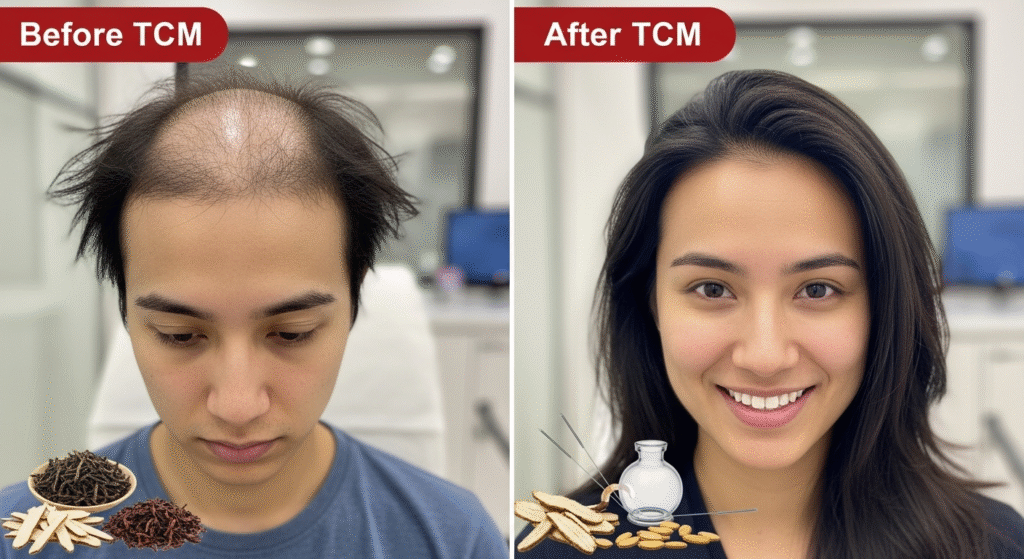Hair loss can be a distressing and often confusing issue for many people. Whether it's thinning hair, receding hairlines, or general shedding, finding the right solution can seem like a daunting task. Traditional Chinese Medicine for Hair Loss offers a holistic, natural approach to treating hair loss, focusing on restoring balance within the body and …
Hair loss can be a distressing and often confusing issue for many people. Whether it’s thinning hair, receding hairlines, or general shedding, finding the right solution can seem like a daunting task. Traditional Chinese Medicine for Hair Loss offers a holistic, natural approach to treating hair loss, focusing on restoring balance within the body and stimulating hair growth from the roots.
In this article, we explore how TCM practices such as acupuncture, herbal remedies, and diet can help reduce hair thinning, promote healthy hair growth, and improve scalp health. If you’re looking for a natural alternative to traditional treatments, TCM could be the solution for you.

What is Traditional Chinese Medicine (TCM) and How Does It Address Hair Loss?
Traditional Chinese Medicine (TCM) is an ancient system of medicine that has been used for over 2,000 years. It focuses on the idea of balancing the body’s vital energy (Qi) and restoring harmony between the mind, body, and spirit. According to TCM principles, hair loss is not just a cosmetic issue but a symptom of an internal imbalance, often related to deficiencies in the body’s vital forces.
How TCM Treats Hair Loss
TCM views hair loss as a result of an imbalance in the body’s Qi, blood, and organ systems. When these energies are out of sync, hair follicles may not receive enough nourishment, leading to thinning hair and eventually hair loss. The goal of TCM treatment is to restore balance and enhance the flow of energy and nutrients to the scalp, which supports hair growth.
Acupuncture, herbal remedies, and dietary adjustments are some of the primary methods used in TCM to treat hair loss. These treatments work by stimulating circulation to the scalp, reducing inflammation, and nourishing the hair follicles with essential nutrients.
Key TCM Practices for Hair Loss Treatment

1. Acupuncture: Stimulating Hair Growth with Traditional Needling Techniques
Acupuncture is a widely practiced TCM therapy that involves inserting fine needles into specific points on the body to balance energy and stimulate healing. When it comes to hair loss, acupuncture targets areas on the scalp to improve blood flow and stimulate hair follicles.
How Acupuncture Helps:
- Improves Circulation: Acupuncture increases blood flow to the scalp, ensuring that hair follicles receive the nutrients they need for healthy growth.
- Reduces Inflammation: By reducing inflammation in the scalp, acupuncture can help create a healthier environment for hair to grow.
- Stimulates Hair Follicles: Regular acupuncture treatments can encourage dormant hair follicles to become active again, promoting hair regrowth.
Acupuncture is typically performed in multiple sessions, with noticeable results appearing within 6–12 weeks.
2. Herbal Remedies in TCM for Hair Regrowth
In addition to acupuncture, TCM uses various herbs to promote hair health. Some of the most commonly used herbs for hair loss include:
- He Shou Wu (Fo-ti): Known for its ability to restore hair color and prevent premature graying, He Shou Wu is one of the most popular herbs used in TCM for hair regrowth.
- Ginseng: Ginseng improves circulation, boosts energy, and promotes hair growth by nourishing the scalp.
- Angelica Root: Often used to replenish blood and stimulate hair follicles, Angelica Root is considered a powerful herb for rejuvenating hair growth.
These herbs are often taken in the form of teas, capsules, or applied topically as oils or tinctures. They are believed to nourish the scalp and hair follicles, reduce hair thinning, and encourage the growth of healthy hair.
3. TCM Dietary Recommendations for Healthy Hair
According to TCM, a balanced diet is essential for maintaining healthy hair. Foods that nourish the liver, kidneys, and blood are believed to support hair growth. Some key foods to include in your diet for hair health are:
- Black sesame seeds: Rich in nutrients, these seeds are believed to nourish the kidneys and liver, which are integral to healthy hair.
- Goji berries: Known for their ability to replenish blood and improve circulation, goji berries are commonly used in TCM for overall health and hair regrowth.
- Bone broth: This nutrient-dense food supports the body’s Qi and provides the collagen necessary for strong, healthy hair.
Additionally, TCM advises avoiding greasy, fatty foods, as they can lead to an imbalance in the body’s energy and contribute to hair loss.
How Effective Is Traditional Chinese Medicine for Hair Loss?

While traditional treatments for hair loss, such as minoxidil and finasteride, are commonly used, many individuals are turning to Traditional Chinese Medicine (TCM) for its natural, holistic approach. But does TCM really work for hair loss?
Scientific Research and Evidence Supporting TCM for Hair Loss
Numerous studies have explored the effectiveness of acupuncture and herbal treatments for hair loss. Research published in the Journal of Dermatology found that acupuncture significantly improved scalp circulation, stimulating hair follicles and promoting hair regrowth in participants with alopecia. Similarly, a study on He Shou Wu demonstrated its potential to improve hair density and slow down hair thinning.
Potential Side Effects and Considerations of Chinese Medicine for Hair Loss Treatments

Acupuncture: Possible Side Effects and Risks of Chinese Medicine for Hair Loss
Acupuncture is generally safe when performed by a licensed practitioner, but there are some risks involved, including:
- Soreness or bruising at the needle insertion points.
- Infection risk if acupuncture needles are not properly sterilized.
Herbal Remedies: What to Watch Out For
Some herbal remedies can interact with medications or cause allergic reactions. For example:
- He Shou Wu may interact with blood thinners.
- Ginseng can cause an increase in blood pressure in some individuals.
Before starting any herbal regimen, consult with a healthcare provider to ensure safety.
How Long Does It Take to See Results with Chinese Medicine for Hair Loss?
Patience is key when using Traditional Chinese Medicine for hair loss. While some people may experience improvements in as little as 6 weeks, it may take up to 3 to 6 months to see significant regrowth. Results vary depending on the severity of hair loss and the individual’s health.
Consistency is important. For the best results, follow your TCM practitioner’s recommendations closely and make the necessary lifestyle and dietary changes.
Expert Tips for Incorporating TCM into Your Hair Care Routine
Maintain a healthy diet, reduce stress, and avoid excessive heat styling to maximize TCM results.
Starting with Acupuncture for Hair Growth
Schedule weekly acupuncture sessions for the first 6 weeks and monitor progress.
Using TCM Herbal Remedies Safely
Always follow the recommended dosage and consult a professional if you experience any side effects.
Combining TCM with Other Hair Care Practices
FAQs
1. Can TCM Cure Male and Female Pattern Baldness?
TCM may help slow down the progression of male and female pattern baldness and improve hair quality. However, it may not fully reverse advanced stages of baldness.
2. Is TCM Safe to Combine with Other Hair Loss Treatments?
Yes, TCM can complement modern hair loss treatments, but it’s important to consult your healthcare provider before combining therapies.
3. How Do I Find a Qualified TCM Practitioner for Hair Loss?
Look for a licensed acupuncturist or TCM practitioner with experience in treating hair loss. Many clinics offer consultations to discuss your specific needs.
4. What Happens if TCM Doesn’t Work for Me?
If TCM doesn’t yield the desired results, consider exploring other options, such as prescription treatments or hair transplant surgery. Always consult with a medical professional for alternative solutions.
Conclusion
Traditional Chinese Medicine offers a unique, natural solution for those struggling with hair loss. By addressing the root causes of hair thinning and restoring balance to the body, TCM can help promote hair regrowth and overall scalp health.
Ready to take action? Book a consultation with Dr. Uzma Irfan, an ISHRS-certified surgeon in Islamabad today and start your journey towards healthier, fuller hair.






